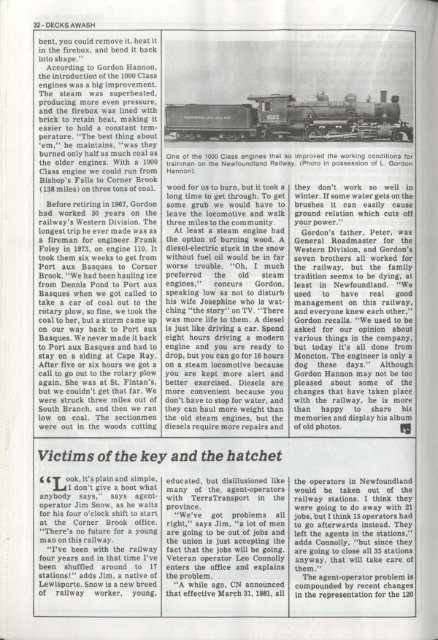OlCKSavvash - Memorial University of Newfoundland
OlCKSavvash - Memorial University of Newfoundland
OlCKSavvash - Memorial University of Newfoundland
Create successful ePaper yourself
Turn your PDF publications into a flip-book with our unique Google optimized e-Paper software.
32 - DECKS AWASH<br />
bent, you could remove it, heat it<br />
in the firebox, and bend it back<br />
into shape."<br />
According to Gordon Hannon,<br />
the introduction <strong>of</strong> the 1000 Class<br />
engines was a big improvement.<br />
The steam was superheated,<br />
producing more even pressure,<br />
and the firebox was lined with<br />
brick to retain heat, making it<br />
easier to hold a constant temperature.<br />
"The best thing about<br />
'em," he maintains, "was they<br />
burned only half as much coal as<br />
the older engines. With a 1000<br />
Class engine we could run from<br />
Bishop's Falls to Corner Brook<br />
(138 miles) on three tons <strong>of</strong> coal.<br />
Before retiring in 1967, Gordon<br />
had worked 50 years on the<br />
railway's Western Division. The<br />
longest trip he ever made was as<br />
a fireman for engineer Frank<br />
Foley in 1973, on engine 110. It<br />
took them six weeks to get from<br />
Port aux Basques to Corner<br />
Brook. "We had been hauling ice<br />
from Dennis Pond to Port aux<br />
Basques when we got called to<br />
take a car <strong>of</strong> coal out to the<br />
rotary plow, so fine, we took the<br />
coal to her, but a storm came up<br />
on our way back to Port aux<br />
Basques. We never made it back<br />
to Port aux Basques and had to<br />
stay on a siding at Cape Ray.<br />
After five or six hours we got a<br />
call to go out to the roiary plow<br />
again. She was at St. Fintan's,<br />
but we couldn't get that far. We<br />
were struck three miles out <strong>of</strong><br />
South Branch, and then we ran<br />
low on coal. The sectionmen<br />
were out in the woods cutting<br />
One 01 the 1000 Class engines that so imprO'led the working conditions lor<br />
trainmen on the <strong>Newfoundland</strong> Railway. (Photo in possession 01 L. Gordon<br />
Hannon).<br />
wood for us to burn, but it took a<br />
long time to get through. To get<br />
some grub we would have to<br />
leave the locomotive and walk<br />
three miles to the community.<br />
At least a steam engine had<br />
the option <strong>of</strong> burning wood. A<br />
diesel-electric stuck in the snow<br />
without fuel oil would be in far<br />
worse trouble. "Oh, I much<br />
preferred the old steam<br />
engines," concurs Gordon,<br />
speaking low as not to disturb<br />
his wife Josephine who is wat·<br />
ching "the story" on TV. "There<br />
was more life to them. A diesel<br />
is just like driving a car. Spend<br />
eight hours driving a modern<br />
engine and you are ready to<br />
drop, but you can go for 16 hours<br />
on a steam locomotive because<br />
you are kept more alert and<br />
better exercised. Diesels are<br />
more convenient because you<br />
don't have to stop for water, and<br />
they can haul more weight than<br />
the old steam engines, but the<br />
diesels require more repairs and<br />
Victims <strong>of</strong>the key and the hatchet<br />
"Look, it's plain and simple,<br />
I don't give a hoot what<br />
anybody says," says agentoperator<br />
Jim Snow, as he waits<br />
for his four o'clock shift to start<br />
at the Corner Brook <strong>of</strong>fice.<br />
"There's no future for a young<br />
man on this railway.<br />
"I've be"en with the railway<br />
four years and in that time I've<br />
been shuffled around to 17<br />
stations!" adds Jim, a native <strong>of</strong><br />
Lewisporte. Snow is a new breed<br />
<strong>of</strong> railway worker, young,<br />
educated, but disillusioned like<br />
many <strong>of</strong> the. agent·operators<br />
with TerraTransport in the<br />
province.<br />
"We've got problems all<br />
right," says Jim, "a lot <strong>of</strong> men<br />
are going to be out <strong>of</strong> jobs and<br />
the union is just accepting the<br />
fact that the jobs will be going.<br />
Veteran operator Leo Connolly<br />
enters the <strong>of</strong>fice and explains<br />
the problem.<br />
"A while ago, CN announced·<br />
that effective March 31, 1981, all<br />
they don't work so well in<br />
winter. If some water gets on the<br />
brushes it can easily cause<br />
ground relation which cuts <strong>of</strong>f<br />
your power."<br />
Gordon's father, Peter, was<br />
General Roadmaster for the<br />
Western Division, and Gordon's<br />
seven brothers all worked for<br />
the railway, but the family<br />
tradition seems to be dying, at<br />
least in <strong>Newfoundland</strong>. "We<br />
used to have real good<br />
management on this railway,<br />
and everyone knew each other,"<br />
Gordon recalls. "We used to be<br />
asked for our opinion about<br />
various things in the company,<br />
but today it's all done from<br />
Moncton. The engineer is only a<br />
dog these days." Although<br />
Gordon Hannon may not be too<br />
pleased about some <strong>of</strong> the<br />
changes that have taken place<br />
with the railway, he is more<br />
than happy to share his<br />
memories and display his album<br />
<strong>of</strong> old photos. 1'1<br />
the operators in <strong>Newfoundland</strong><br />
would be taken out <strong>of</strong> the<br />
railway stations. I think they<br />
were going to do away with 21<br />
jobs, but I think 15 operators had<br />
to go afterwards instead. They<br />
left the agents in the stations,"<br />
adds Connolly, "but since they<br />
are going to close all 35 stations<br />
anyway, that will take care <strong>of</strong><br />
them."<br />
The agent-operator problem is<br />
compounded by recent changes<br />
in the representation for the 120

















